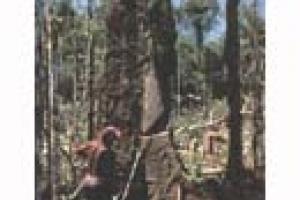In the framework of the World Social Forum, representatives of Latin American NGOs got together to discuss the possibility of coordinating efforts with respect to the growing problem of tree monocultures.
During this meeting, the factors promoting territorial occupation by monocultures aimed at timber, cellulose fibre and palm oil production were analysed, together with factors limiting this occupation.
Brazil
Bulletin articles
11 February 2003
Presented as a "clean" source of energy that does not contaminate the atmosphere with greenhouse gases, as in the case of oil or natural gas, obtaining hydroelectric energy by building dams continues to advance along the Xingu river, the last of the great Amazon rivers in good state of conservation.
Bulletin articles
2 January 2003
In 2002, hope overcame fear. In 2003, hope may result in a political agreement between the middle class voters who, devastated by unemployment and impoverished by the economic policy, lost their fear of change, and the worker voters who, hounded by poverty and violence, no longer fear being happy.
Bulletin articles
3 December 2002
The PCF (Prototype Carbon Fund) is the World Bank's fund that mobilizes resources to promote the carbon dioxide trade, whereby contaminating companies --mainly located in the countries of the North-- can "negotiate" with forestry producers which supposedly trap carbon --mainly located in the countries of the South. And it is to the PCF that, representatives of dozens of bodies, citizen movements, churches, parliamentatians, city councillors and citizens of the Brazilian States of Minas Gerais, Espirito Santo, Bahia and Rio de Janeiro will be sending a letter.
Bulletin articles
7 November 2002
A group of seven researchers assessed the certifications of the V&M Florestal Ltda. Company (Vallourec & Mannesman), which obtained FSC certification in 1999 for its whole area of 235,886 hectares, through the certification firm SGS. They also assessed those of Plantar Reflorestamentos S.A., which obtained SCS certification for an area of 13,287 hectares. With this certification, V&M Florestal became the company with the largest certified area in Brazil.
Other information
7 October 2002
Over the past few years, an increase in the participation of rural producers’ families and their economic and representative organisations has been noted in activities relating to management and conservation of resources in the Brazilian Amazon.
Other information
18 July 2002
Only available in Spanish
Publicación de Censat-Agua Viva en ocasión de la Cumbre Mundial de Johannesburgo.
Amazonía: Selva y Bosques diez años después de Río
Bulletin articles
12 July 2002
It is amazing the way in which Aracruz Celulose S.A. is facing the situation in which it is placed, affected by the numerous negative impacts arising from its activities in Espirito Santo and Bahia. At present, the company is finishing the construction of a private airport, sufficiently large for the presidential plane carrying Fernando Henrique Cardoso to land on 2nd August when their third factory will be officially opened, increasing annual eucalyptus cellulose production from 1.3 to 2 million tons.
Other information
12 July 2002
A Brazilian industrial plantation project hoping to get a subsidy from the UN for sucking up carbon from the atmosphere has failed to make its case, according to the project's official validator.
Det Norske Veritas (DNV), a norwegian company assigned by the World Bank's Prototype Carbon Fund (PCF) to check the project's claims, says that it can't determine whether carbon could be held in the project's eucalyptus trees long enough to make any difference to the climate system.
Bulletin articles
14 May 2002
After five weeks of functioning, the Parliamentary Commission of Enquiry (CPI), created to investigate irregularities related to Aracruz´ activities in the state of Espirito Santo, has already revealed a large number of complaints, irregularities and illegal activities of the multinational over the past 30 years.
Bulletin articles
15 April 2002
Since their arrival in the Amazon, “white men” have had an ever-increasing impact on that region. However, it was not until World War 2 that deforestation became a large-scale process. Today, some 80% of the Amazon forest is still standing, but estimations are that its destruction will be completed in the next decades if nothing is done to stop it. The hope that “something” could be done was closer than ever in 1989, when the first meeting of indigenous peoples was held in Altamira.
Bulletin articles
15 April 2002
It is worth noting that many people are not aware of the great diversity of ecosystems of the South American continent. Its great longitude and altitude variation, ranging from sea level to over 7000 metres, as well as its great variety of climates, enables the presence of diverse and different ecosystems, including the largest tropical rainforest (the Amazon Rainforest) and the planet's driest desert (Atacama desert).

